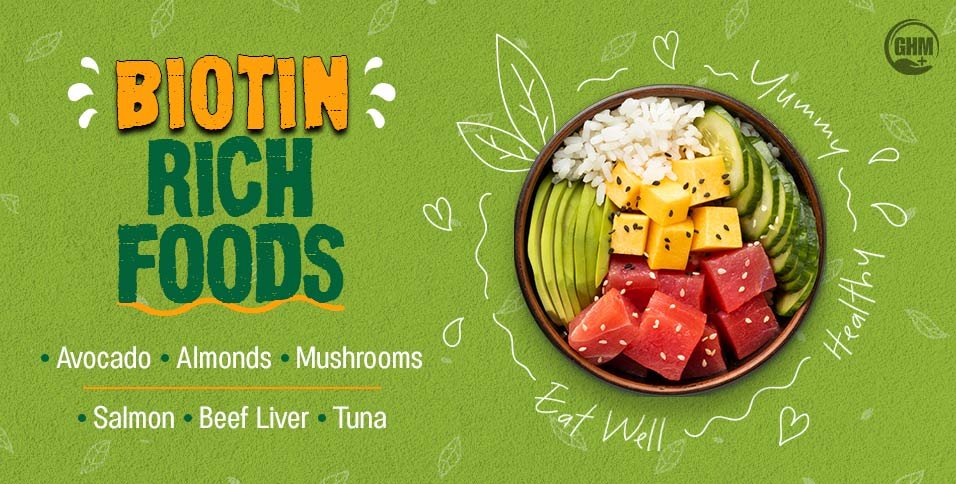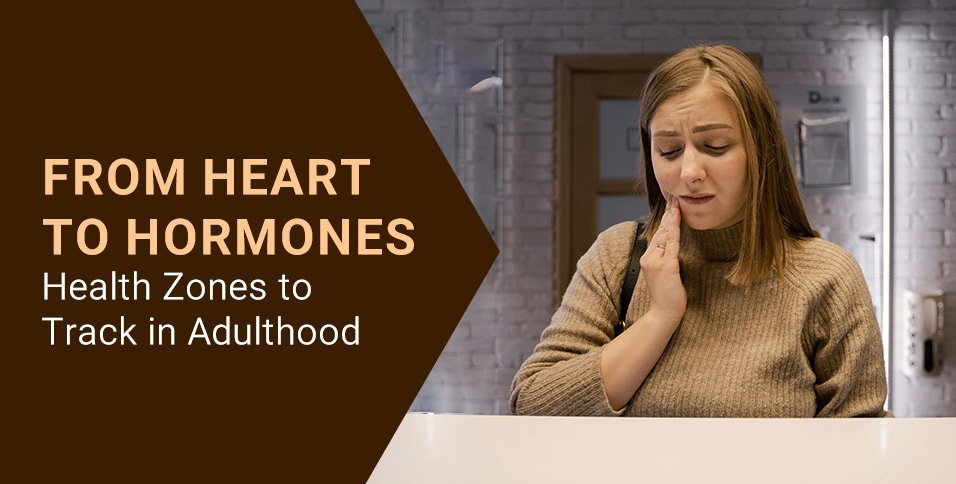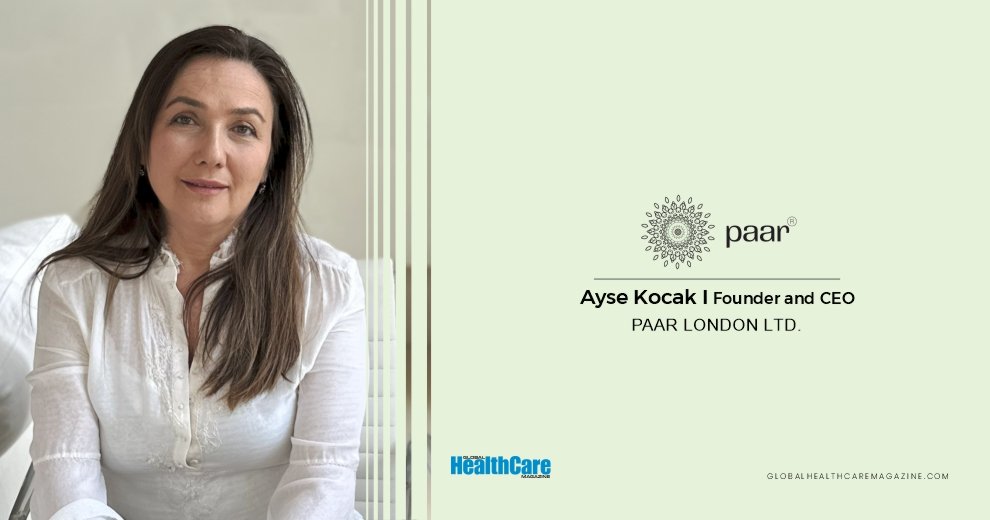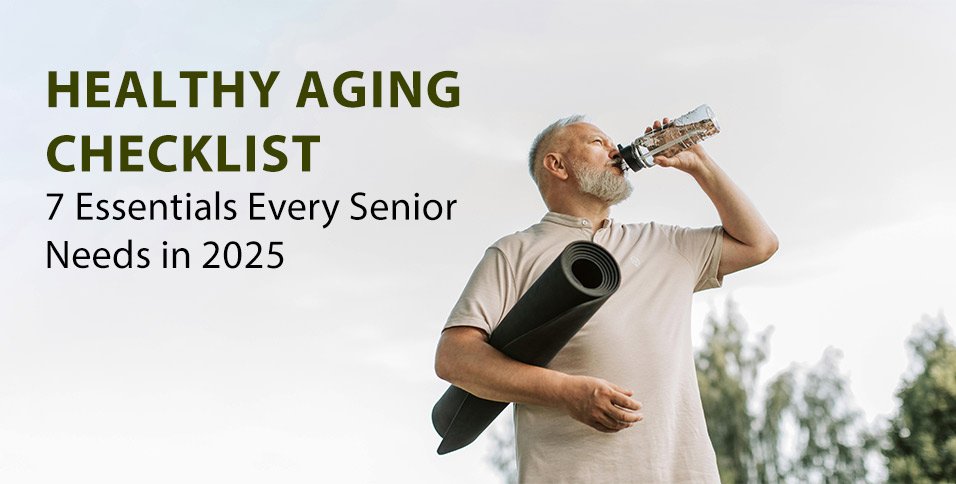Hair fall? Brittle nails? Tired even after a full night’s sleep? These aren’t always random issues—they might point to low biotin levels. Biotin, also called Vitamin B7 or Vitamin H, is a water-soluble vitamin that helps your body convert carbs, fats, and proteins into usable energy. It quietly powers your day-to-day health, without flashy promises. Instead of rushing to supplements, start with your plate. Nature already offers a wide range of biotin rich foods, like almonds, sweet potatoes, and salmon. These foods don’t just give you biotin—they also provide healthy fats, fiber, and antioxidants that work together for better results.
Important Note: This content is for educational use only. Always consult a licensed healthcare professional before changing your diet, especially if you’re pregnant, breastfeeding, or on medication.
Why is Biotin Important? Understanding Its Role in Your Body
Biotin acts as a dynamic metabolic maestro, helping your body convert carbohydrates, fats, and proteins into energy. This fuels everything you do, whether walking, playing, or thinking. Biotin also supports hair health without making giant promises. People with low biotin sometimes have thinning hair. In rare cases like uncombable hair syndrome, 3–5 mg/day of biotin helped restore hair in children after 3–4 months. Including biotin-rich foods such as eggs, nuts, fish, and liver supports healthy hair by keeping keratin production going.
Biotin helps maintain healthy skin. Infants with skin rashes or dermatitis improved after 100 µg–10 mg/day of biotin. This effect also supports general skin wellness from foods or supplements, without overpromising. Biotin plays a solid role in nail strength, too. Small studies using 2.5 mg/day showed a 25% increase in nail thickness, firmer nails in 91% of participants, and clinical improvements in brittle nails.
Moreover, biotin supports the nervous system. Deficiency links to fatigue, depression, or tingling, so regular intake helps maintain healthy nerve function. Biotin may also support liver function by aiding fatty acid synthesis and detox pathways. It might help regulate blood sugar, too: a 9 mg/day study in type 2 diabetes found a 45% drop in fasting glucose over 30 days. Another meta-analysis confirmed improved glycemic control in people with diabetes. These results do not imply medical advice but highlight possible roles.
In diet terms, most Western adults consume around 35–70 µg/day biotin, aligning well with the 30 µg/day Adequate Intake recommendation. Including biotin-rich foods like eggs, salmon, pork, nuts, and seeds supports these levels naturally.
Signs of Biotin Deficiency: When to Pay Attention
Most healthy people rarely face biotin deficiency because they eat balanced diets, and gut bacteria make a bit of biotin. The body also recycles this vitamin well. That means you likely get enough if you eat eggs, nuts, fish, and grains regularly.
When biotin runs low, you might notice key signs. Hair can thin or fall out. Nails may become brittle and break easily. You might see red or scaly rashes around your mouth, nose, eyes, or anus. Conjunctivitis (pink eye) can also appear. Your nerves may send odd signals, making your hands or feet feel numb or tingly. You may feel tired, down, or sluggish, too.
Certain people face more risk. Pregnant or breastfeeding women often use biotin faster than usual—up to half of them may have slightly low levels. Genetic conditions like biotinidase deficiency or holocarboxylase synthetase deficiency stop the body from using or recycling biotin properly. Chronic alcohol use, long-term antibiotic or anti-seizure medication use, smoking, older age, and eating raw egg whites (because of avidin) can block absorption.
You should talk to a doctor if you see these symptoms. A professional can run blood or urine tests to check biotin levels or enzyme function. Early detection helps prevent serious issues. For example, newborn screening finds biotinidase deficiency early, which avoids seizures, vision or hearing loss, or developmental delays.
Top Biotin-Rich Foods: Your Dietary Powerhouses
A. Vegetarian Biotin Sources:
- Eggs (cooked whole) – ~10 µg biotin per egg (~33% DV). They deliver protein and B vitamins. Always cook eggs to deactivate avidin and improve absorption. Tip: Scramble with greens for a quick breakfast.
- Almonds (¼ cup) – ~1.5 µg biotin. They offer healthy fats, protein, fiber, vitamin E, and magnesium. Enjoy as a snack or blend into oatmeal.
- Sunflower Seeds (¼ cup) – ~2.6 µg biotin. These seeds add healthy fats, protein, vitamin E, and zinc. Tip: Sprinkle on salads or mix into yogurt.
- Peanuts (1 oz) – ~5 µg biotin. They bring plant protein, fiber, and iron. Add peanut butter to toast or sauces.
- Soybeans (¾ cup) – ~19 µg biotin. They deliver plant protein, fiber, and iron. Use as an edamame snack or in soups.
- Sweet Potatoes (½ cup cooked) – ~2.4 µg biotin. Rich in beta-carotene, fiber, and vitamin A. Roast, mash, or bake as fries.
- Mushrooms (1 cup fresh) – ~5.6 µg biotin. They also provide B vitamins and antioxidants. Sauté into pastas or soups.
- Avocado (medium) – ~1.85 µg biotin. Offers monounsaturated fats, vitamins E & C, and potassium. Mash on toast or blend in smoothies.
- Broccoli (½ cup raw) – ~0.4 µg biotin. It adds vitamins A, C, K, fiber, and calcium. Steam or roast as a side.
- Spinach (½ cup cooked) – ~0.5 µg biotin. Delivers iron, folate, vitamins A, C, and K. Stir into omelets or smoothies.
- Banana (½ cup sliced) – ~0.2 µg biotin. Contains potassium, fiber, and B vitamins. Use in cereal or shakes.
- Oatmeal (1 cup cooked) – ~0.1–0.4 µg biotin. Offers fiber and other B vitamins. Start with porridge or use it in baking.
- Nutritional Yeast (1 tbsp) – ~2–14 µg biotin, varying by brand. It adds B vitamins and flavor. Sprinkle on popcorn, pasta, or soups.
B. Non-Vegetarian Biotin Sources:
- Beef Liver (3 oz cooked) – ~31 µg biotin (103% DV). It’s also high in iron, vitamin A, and B12. Cook with onions or use in pâtés.
- Chicken Liver (3 oz cooked) – ~138 µg biotin (460% DV). Rich in iron and vitamin A. Blend into spreads or add to mixed dishes.
- Salmon (3 oz cooked) – ~5 µg biotin. Contains omega‑3s, protein, and selenium. Bake or grill for salads or bowls.
- Sardines (1 can) – ~5 µg biotin. Offer omega‑3s, vitamin D, and calcium. Tip: Add to salads or toast.
- Tuna (3 oz canned) – ~0.7 µg biotin. Provides protein and niacin. Use in sandwiches, pasta, or poke bowls.
- Pork/Beef (3 oz cooked) – ~4.5 µg biotin. They also deliver protein, iron, and B vitamins. Grill or add to tacos.
- Chicken/Turkey Breast (100 g) – ~0.7 µg biotin. Offers lean protein and B vitamins. Bake and use in wraps or stir-fries.
Daily Biotin Intake: How Much Do You Need?
There is no official Recommended Dietary Allowance (RDA) for biotin. Scientists set Adequate Intake (AI) levels instead, because evidence remains limited. This means we aim for intake amounts that seem to support health in most people, rather than a strict requirement.
Researchers and health agencies generally agree on the following AI levels:
- Adults (19+ years): 150 µg/day
- Pregnant women: 220 µg/day
- Lactating women: 290 µg/day
In practical terms, most people eating a balanced diet easily meet or exceed these AI targets. Typical Western diets supply between 100–150 µg/day of selenium in the United States, and between 35–75 µg/day in some European countries, with main sources including meats, seafood, eggs, nuts (especially Brazil nuts), and whole grains. Biotin is water-soluble—your body uses what it needs and excretes the rest, so high intakes rarely cause harm.
The bottom line is you need to focus on eating a varied, balanced diet to naturally secure your biotin intake; no official RDA needed, but meeting the AI through wholesome foods is both practical and sufficient.
Biotin Supplements vs. Food Sources: Making Informed Choices
Choosing between biotin-rich foods and supplements requires thoughtful consideration. In most cases, food should always come first. Natural sources like eggs, nuts, seeds, and organ meats not only offer biotin in safe and balanced amounts, but they also come with other helpful nutrients like fiber, healthy fats, and antioxidants. These nutrients work together in the body, offering synergistic benefits that no supplement can fully replicate.
Supplements may be considered in rare and medically justified situations. For example, individuals with genetic disorders such as biotinidase deficiency, certain gastrointestinal conditions that impair nutrient absorption, or those recovering from long-term antibiotic use may need supervised supplementation. However, this should always happen under a doctor’s guidance.
A crucial warning must be emphasized here. Biotin supplements, especially in high doses, can interfere with several blood tests, including thyroid function tests and cardiac markers. This interference may lead to false results, which could affect diagnoses and treatment decisions. It is absolutely essential to inform your healthcare provider about all supplements you are taking—including biotin—before any lab test. In fact, you may be advised to pause biotin intake for a few days before testing.
Unlike food-based sources, many biotin supplements contain 5,000–10,000 mcg per tablet, far exceeding daily needs. While no upper limit has been officially established, the long-term effects of such high doses remain unclear. That’s why self-prescribing biotin without a real need can do more harm than good.
Always consult a healthcare professional before taking any biotin supplement. Food is not just safer—it’s smarter.
Maximizing Biotin Absorption and Retention
Cooking eggs properly unlocks biotin by neutralizing avidin, a protein in raw egg whites that tightly binds biotin. Experts recommend thoroughly cooking eggs (e.g., boiling for more than 4 minutes) to ensure near-complete inactivation of avidin, thereby making biotin fully absorbable. Heating above 70°C begins to denature avidin, but complete inactivation typically requires higher temperatures and/or longer cooking times to avoid residual avidin activity and ensure maximum biotin bioavailability
Eating a balanced diet ensures steady biotin intake. Food variety—from nuts to whole grains and vegetables—provides natural, safe amounts of biotin alongside fiber, healthy fats, and antioxidants. This synergy supports better nutrient absorption and overall health, rather than relying on a single source.
Your gut bacteria also play a part. Studies show that many gut microbes synthesize biotin, especially in the colon, and the body can absorb some of it naturally. Maintaining healthy digestion through fiber-rich foods and prebiotics helps support these beneficial bacteria and, in turn, your biotin levels.
Quick tips to maximize absorption:
- Include varied biotin-rich foods daily—like nuts, veggies, eggs, and whole grains.
- Eat fiber-rich foods (e.g., fruits, legumes, whole grains) to nourish gut bacteria that produce biotin.
By following these simple habits, you enhance biotin absorption and retention naturally, with no need for high-dose supplements.
Key Takeaways
When it comes to improving energy, metabolism, or nutritional balance, biotin plays a quiet but essential role. Many discover its importance only after facing symptoms like fatigue, brittle nails, or dull skin, and often, it’s not about deficiency, but suboptimal intake.
Rather than turning to high-dose supplements, food remains the most reliable source. What stands out in practice is how effective everyday biotin rich foods can be when consistently included in meals. Eggs, nuts, seeds, salmon, and sweet potatoes are not just accessible—they come with a bundle of complementary nutrients like fiber, protein, and healthy fats that boost absorption and overall wellness.
Patterns show that small dietary shifts—like cooking eggs properly or adding mushrooms and almonds to meals—can yield subtle but steady improvements. The body responds best when given diverse, balanced inputs. Supplements, on the other hand, may interfere with lab tests and often provide doses far above what’s needed.
The deeper insight is this: food-based biotin intake offers a safer, more synergistic way to meet nutritional needs, especially when supported by a diet rich in whole foods. Long-term wellness builds on consistent choices, not quick fixes.



















